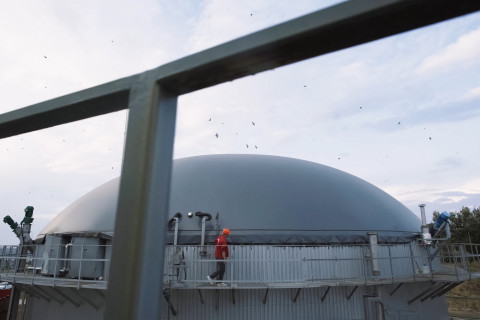The doctoral dissertation in the field of Environmental Policy will be examined at the Faculty of Social Sciences and Business Studies, Joensuu Campus.
What is the topic of your doctoral research? Why is it important to study the topic?
The topic of my Ph.D. research concerns energy transition, and focuses on renewable energies, mainly biomass energy production. I give an overview of the benefits of renewable energies, such as economic growth and reduced environmental externalities, by comparing the development of renewable energy sectors in Italy and Finland. I also go into depth with the impact biogas plants have at the local level, mainly the way they contribute to local economies and farms.
The topic holds a great significance for study due to the fact that the world energy demand is being met largely by non-renewable sources, which have very injurious effects on the environment in terms of climate change and environmental degradation. Transitioning to renewable energy sources will be paramount to decrease adverse impacts while improving energy security and fostering sustainable economic growth. There is, therefore, a need to understand the geographical, socioeconomic, and local conditions that influence the adoption of renewable energies to be able to provide valuable insights to policymakers in designing locally effective strategies toward a sustainable energy transition.
What are the key findings or observations of your doctoral research?
The results show a close correlation between the diffusion of renewable energy sources and the geographical context. The connection is mainly based on the availability of natural resources and waste biomass. This relationship emphasises the importance of geographical location in the promotion and adoption of renewable energy, considering the specific environmental characteristics of each country and region. Whereas Italy, with a more temperate climate, has a different availability of natural resources (e.g. the agricultural and livestock sectors generate significant quantities of waste, which is used as biomass), Finland stands out for its wealth of forest resources. These factors influence the type of biomass available for bioenergy production.
The results of the Granger causality tests indicate weak evidence to support a causal relationship from renewable energy consumption to economic growth and stronger evidence to support a causal relationship from economic growth to renewable energy consumption. The aspect is extremely relevant, as it suggests that the investment and adoption of sustainable energy sources do not only contribute to the mitigation of negative environmental impacts but can also foster sustainable economic development (green growth).
Finally, the results obtained from the systematic literature review and case study confirm the economic, social, and environmental potential of biogas plants for a small to medium-sized farm and for the local economy. The results also underline the importance of the location of biogas plants and suggest how to manage inefficiencies by correctly (re)locating the plants.
The results pave the way for policy recommendations for facilitating energy transition. The results suggest that policy measures should provide incentives for the adoption of sustainable instruments both for environmental and economic reasons: renewable energies help meeting sustainability targets and at the same time can facilitate (local) economic growth. The planning of such policy measures should take place through a collaboration between national and regional government agencies, local businesses, and other stakeholders.
An interesting aspect that emerges is related to the importance of localised policies that can take into account the characteristics of specific geographical areas through an assessment of their energy potential. Furthermore, based on the results of the case study, it emerges that policies that support decentralised energy systems through incentive taxes and direct financial support are fundamental for energy transition.
How can the results of your doctoral research be utilised in practice?
The study provides analytical tools and suggestions to businesses and local communities. First, the study includes an assessment of the economic benefits of biogas production in the case study company that is replicable in other companies. Second, the study offers tools for companies to assess the “optimal” location for biogas plants. Third, the study emphasises the importance of renewable energy communities to reduce energy poverty and promote economic growth in local,particularly rural, contexts.
What are the key research methods and materials used in your doctoral research?
Descriptive analysis was used to provide a broad view of trends, dynamics, and external factors influential to the deployment of renewable energies. This was meant to map the landscape of renewable energy usage and its growth over time. Granger causality tests were used to investigate causality between renewable energy consumption and economic growth. Such a method was important for the assessment of the role of renewables within the context of wider trends in economic performance. Content analysis was used to analyse textual data of biogas plants through the systematic screening of literature. The method helped me to find themes, benefits, and challenges of biogas production, and its impact on the local economies. SWOT analysis was used to regard strengths, weaknesses, opportunities, and threats of biogas plants, and to analyze the role of renewable energy communities.
The doctoral dissertation of Luca Esposito, MEcon, entitled An analysis of renewable energy policies, markets, and resources, through an econometric approach: A comparative study on Italy and Finland will be examined at the Faculty of Social Sciences and Business Studies. The opponent will be Professor, Doctor Tommi Inkinen, University of Turku, and the custos will be Professor Teemu Makkonen, University of Eastern Finland. Language of the public defence is English.
For further information, please contact:
MEcon, Luca Esposito, luca.esposito(at)uef.fi
